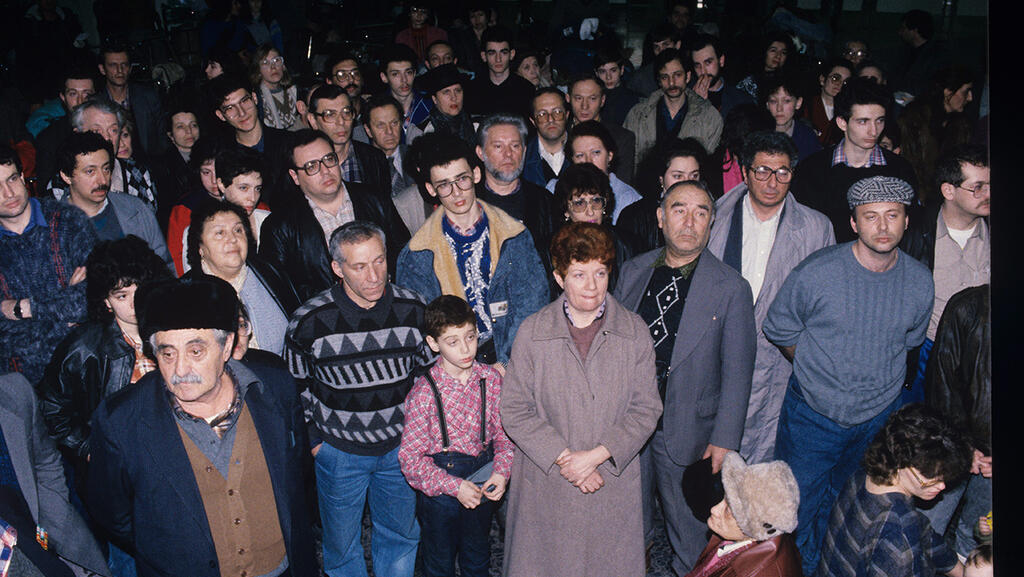The early-to-mid 90s was a different time for Israel.
The major wave of immigrants from the former Soviet Union was at its infancy, Boyz 2 Men couldn't stop singing about how they want to "make love to you", George Bush Sr. had just stopped Saddam Hussein's invasion of Kuwait, Prime Minister Yitzhak Shamir's national unity government had collapsed, Benjamin Netanyahu was still a junior politician, who was only speaking about Iran's nuclear ambitions 60% of the time and the perception of Labor party chairman Yitzhak Rabin was that of an experienced military general, having previously served as the IDF Chief-of-Staff.
That perception, among other factors, contributed to the Israeli public's receptiveness towards the left, as was reflected in the 1992 elections. The labor party won a staggering 44 seats in the Knesset. Meretz, the labor's "little sister" party won an impressive 12 seats.
The three subsequent years saw the Israeli public, minus some fringe voices, show more cautious optimism about peace talks with the Palestinians and specifically Yasser Arafat, the first President of the Palestinian National Authority.
After all, Rabin, Arafat and Shimon Peres won the 1994 Nobel peace prize. That year, the public saw the direction of the county, with optimism while striving for peace.
And then came November of 1995. Yigal Amir, a far-right nationalist ideologue, decided to end that optimism in the most extreme of ways - political assassination.
Yitzhak Rabin died and with him - the dream of peace. Sure, Shimon Peres held on to the tattered dream at first and promised a rosy future, but then everything started going wrong. Busses were blowing all over the place, Israeli citizens were killed by the dozens and the public became traumatized.
Politics is about knowing how to use existing circumstances to your advantage and Netanyahu capitalized impressively - He weaponized the trauma as a battering ram against the left's "delusional dreams of peace". One of his ads showed Palestinian tanks (ignoring the fact they didn't have any) rolling through the streets of Tel Aviv.
The 1996 elections saw Netanyahu steal victory from the jaws of defeat, right at the last minute, and the Israeli experience headed into a new direction, one full of apprehension, suspicion , hostility towards Palestinians and the inability to hold productive peace talks.
Netanyahu himself did what he could to ferment suspicion towards the left, by whispering to Rabbi Kaduri, a spiritual leader of the Sephardi ultra-Orthodox community, that "the left forgot what it was like to be Jewish."
Yigal Amir got exactly what he wanted, if you ignore his life sentence.
Fast forward to 2022, and the Labor party are down to a pathetic tally of four seats. And Meretz? The most to the left, of left-wing parties in the country? They're wiped out.
The new left? Well, that's the centrist "Yesh Atid" party. That's the most far to the left you are allowed to be right now, without being referred to as political roadkill.
It wasn't the left's fault, right? How could Labor and Meretz withstand a constant barrage of domestic and geopolitical punches to the face ? And it's not just terrorist attacks, mind you.
Much of Europe, Latin America, Asia and the United States have seen ideological shifts towards political autocracy and authoritarianism. The U.S had Trump (whose effects still linger), the U.K had Boris Johnson, Brazil had Bolsonaro and Italy now has Giorgia Meloni. The Philippines even had Rodrigo Duterte, who made some of the others on the list seem reasonable by comparison.
It seems like the whole world is rejecting the left.
Wrong. Or at least - that's not the whole story. We're sold on the theory that the left can't compete against Netanyahu and the right-wing, because their policies are undesirable. Not in lockstep with the Israeli ethos. Is that true?
The left is largely in favor of nationalizing swaths of land to build public housing as a method of mitigating the insane spike in rent prices all over the country. The left is in favor of getting tougher with the private sector to at least slow the rise of the cost of living (ignoring for a second just how advantageous a step like that would actually be) and, on the security front, they're in favor of a two-state solution.
Yes, the two-state concept is unpopular in many parts of the country. On the other hand, it's far from being some far-left cuckoo idea. It's been around for decades and experienced fluctuating levels of acceptance among Israelis.
The left is in favor of integrating more Arab-Israelis into positions of power. Today's right labels that as "associating with terrorist sympathizers". However, that too, is not a crazy, unprecedented leftist notion.
The first Muslim minister in a sitting government was Raleb Majadele 15 years ago. Many others have done so since. Today, over 1,200 Muslims serve in various departments of the Israeli police force. An increasing number of Muslims even serve in the IDF.
In the private sector, it is increasingly ubiquitous. The service and construction industries have countless Arabs working side by side with Jewish Israelis on a daily basis.
No matter how you cut it, the left's ideas and policies are not at all far from the everyday Israeli state of mind.
So why did Labor and Meretz get their rear end's handed to them in the last election? Because they're run by people that should not be trusted to promote a Lemonade stand, and they've neglected to understand something basic, which Netanyahu understood a long time ago - Politics is the art of conveying a message.
It doesn't matter how extreme it is. If it's packaged correctly, the people will accept it.
But for over 20 years, the left has been in reactive mode. The right says they're unpatriotic and consorting with terrorists, and the left apologizes. They cower into the corner and whisper, with a trembling political voice: "We're sorry, please don't hurt us. We promise we're patriotic too."
They're reacting to political developments instead of initiating them. They explain why Netanyahu is bad and say not one word about why they're good. They justify including Arab-Israelis in positions of power instead of celebrating it.
Much like all people, the average Israeli is a product of his environment. Surrounded by traditional enemies, Israelis can be forgiven for being at least somewhat belligerent and aggressive in their demeanor and the way they conducts himself.
Israel's Right-wing has an aggressive political messaging apparatus, so the people find it easier and more comforting to connect with that message.
The left is too busy apologizing, justifying and reacting. If it was a date, the Israeli public would say it's a turnoff, hastily pay for the drinks and say they've forgotten to turn off the iron and make a quick escape. The left, at the moment, is just not a very attractive date.
Sometimes the left doesn't react at all, letting the right's unfounded accusations go unanswered, which creates a vacuum.
Nature abhors a vacuum, so it's immediately filled with more attacks and gossip about the ineptitude of the Israeli left, further compromising their ability to effectively assemble a political message.
The Israeli political sphere is filled with messages from the center right and far right, leaving no viable alternative for the moderate Israeli voter to turn to. Many right wing voters do not necessarily love Netanyahu or his Likud party or even Ben Gvir.
They just arrive on election day, see no alternative that could have potentially won them over from the left, and cast a vote for the devil they know.






